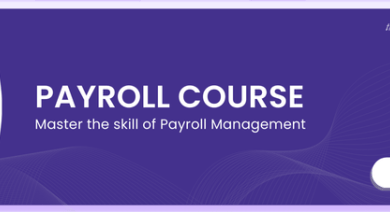
Charting your course to success with a payroll diploma is key to a rewarding career. This comprehensive guide delves into the world of payroll, exploring the importance of a diploma, the skills it cultivates, and the various career paths it unlocks. From understanding the curriculum and benefits to mastering payroll software and navigating the job market, we’ll equip you with the knowledge to chart your own course towards a successful payroll career.
This in-depth exploration covers everything from introductory concepts to advanced practical applications. We’ll analyze the benefits of pursuing a payroll diploma, highlighting the long-term career advantages and financial security it offers. We’ll also cover finding the right program, mastering payroll software, and staying current with industry trends. Real-world examples and case studies will solidify your understanding, ensuring you’re well-prepared to excel in this crucial field.
Introduction to Payroll Diploma

A payroll diploma is a valuable credential in today’s business world. It equips individuals with the knowledge and skills necessary to manage employee compensation accurately and efficiently. In a globalized economy where businesses operate across various jurisdictions and employment laws, precise and compliant payroll processing is paramount. This certification is essential for maintaining a strong reputation, avoiding legal issues, and ensuring financial stability for both employees and employers.Payroll professionals are crucial for the smooth functioning of any organization.
Their expertise ensures accurate and timely payment of salaries, benefits, and taxes, minimizing errors and maximizing productivity. A payroll diploma program offers a structured path to acquire these vital skills and knowledge.
Curriculum of a Payroll Diploma Program
Payroll diploma programs typically cover a range of topics, providing a comprehensive understanding of the payroll process. These programs often include modules on fundamental accounting principles, which form the bedrock of payroll calculations. Understanding the different types of compensation, deductions, and benefits is also integral.
- Payroll calculations, including gross pay, deductions (taxes, insurance, retirement), net pay, and overtime calculations.
- Understanding federal, state, and local tax regulations and their implications on payroll processing.
- Employee record management, ensuring compliance with data privacy regulations.
- Payroll software and technology, including how to utilize payroll systems effectively.
- Compliance with employment laws, including understanding labor laws and relevant legislation.
- Preparation of payroll reports and analysis for financial reporting.
Career Paths
A payroll diploma opens up a variety of career options. Graduates can find employment in various sectors, leveraging their expertise in handling employee compensation.
Charting your course to success with a payroll diploma is all about building a solid foundation. Understanding the intricacies of payroll is key, but also looking at how to best apply that knowledge in a business context. This naturally leads to refining due diligence for enterprise open source projects, which is crucial for ensuring a strong and secure approach, and ultimately contributing to your future success.
After all, a strong payroll foundation can help you in any enterprise, whether it’s utilizing open source software or not. So, dive into the topic further with this insightful guide on refining due diligence for enterprise open source and see how it all connects back to your payroll diploma journey.
- Payroll Specialist:
- Payroll Clerk:
- Payroll Manager:
- Compensation Analyst:
- Human Resources Generalist:
- Payroll Consultant:
Skills for Payroll Success
Success in a payroll career requires a combination of technical and soft skills.
- Accuracy and attention to detail are paramount, as even minor errors can lead to significant consequences, both legally and financially. Payroll calculations require precise attention to detail to ensure accurate results. A simple error in calculating overtime or tax deductions can lead to substantial discrepancies, potentially exposing the company to legal repercussions and causing financial burdens for the organization.
- Strong analytical skills are crucial for identifying potential errors, reconciling discrepancies, and ensuring compliance with complex regulations. Analyzing and interpreting data are vital for spotting discrepancies and identifying potential errors, which can range from simple arithmetic mistakes to more complex violations of regulations.
- Strong time management skills are essential for meeting deadlines, processing payroll data in a timely manner, and adhering to legal requirements. Meeting payroll deadlines is crucial, as missed payments can result in penalties and legal issues. Payroll professionals must adhere to strict timeframes to ensure timely processing.
- Excellent communication skills are essential for interacting with employees, supervisors, and other stakeholders. Clear and effective communication with employees and managers about payroll information and procedures is critical.
Advantages of Pursuing a Payroll Diploma
Pursuing a payroll diploma offers several benefits, including career advancement and financial stability.
- Increased Earning Potential: Payroll professionals with a diploma often command higher salaries compared to those without specialized training. A payroll diploma signifies a dedicated investment in professional development and competence.
- Improved Job Security: In a competitive job market, specialized skills in payroll management can enhance job security and open up more opportunities for advancement.
- Enhanced Career Opportunities: Payroll diplomas are a valuable asset for individuals seeking a career in the financial or human resources sector. The expertise gained from this diploma enhances opportunities for career growth.
- Comprehensive Knowledge: A payroll diploma provides a comprehensive understanding of payroll processes, ensuring individuals are well-equipped to handle complex situations and maintain compliance.
Benefits of Charting Your Course with a Payroll Diploma: Charting Your Course To Success With A Payroll Diploma
A payroll diploma is more than just a piece of paper; it’s a stepping stone to a rewarding and potentially lucrative career. This guide explores the tangible advantages of pursuing a payroll diploma, highlighting the long-term career benefits, financial advantages, and job security associated with this specialized field.This in-depth look at the payroll diploma will show you how it can position you for success in a stable and growing industry, with the potential for significant earnings and career advancement.
Long-Term Career Benefits
A payroll diploma opens doors to a variety of career paths within the field, and often beyond. It provides a strong foundation in payroll principles, procedures, and regulations, enabling professionals to handle increasingly complex tasks as their careers progress. This specialized knowledge allows individuals to excel in roles that require a deep understanding of compensation structures, tax laws, and compliance regulations.
This specialized skillset is highly sought after by employers across diverse industries, giving graduates a competitive edge in the job market.
Financial Advantages
Payroll professionals are often compensated well for their expertise. The financial advantages extend beyond the initial salary. With experience and additional certifications, payroll professionals can progress to senior roles with increased earning potential. The stability of the payroll industry, combined with the growing demand for skilled professionals, further enhances the financial benefits associated with this career path.
Job Security
The payroll industry is relatively recession-proof. Businesses need to manage payroll accurately and efficiently, regardless of economic conditions. This makes payroll professionals valuable assets to any organization. The consistent need for accurate and compliant payroll processing translates into job security and stability for professionals with the necessary skills.
Payroll Roles and Salaries
The payroll field encompasses a variety of roles, each with its own responsibilities and compensation.
- Payroll Specialist: A payroll specialist is responsible for processing employee paychecks, ensuring compliance with tax regulations, and managing payroll records. Average starting salaries for entry-level positions can vary but typically range between $40,000 to $55,000 annually, depending on location and experience. These roles often involve working with payroll software and systems to maintain accuracy and efficiency.
- Payroll Manager: Payroll managers oversee the entire payroll process, including training and supervising payroll specialists. They are responsible for managing budgets, developing policies, and resolving payroll issues. The salary range for payroll managers typically falls between $60,000 to $85,000 or more, depending on experience, location, and the size of the company.
- Senior Payroll Analyst: Senior payroll analysts often provide guidance to the payroll team, handle complex payroll issues, and conduct payroll audits. They may also be responsible for implementing new payroll systems or procedures. Salary expectations for this role typically start above $70,000 and can reach significantly higher levels depending on experience, certifications, and specific job responsibilities.
Salary Progression with Experience and Certifications
The following table demonstrates how salary can increase with experience and relevant certifications. This data is based on averages and can vary depending on location, industry, and company size.
| Experience Level | Certifications | Estimated Annual Salary Range |
|---|---|---|
| Entry-Level (0-2 years) | Payroll Diploma | $40,000 – $55,000 |
| Mid-Level (3-5 years) | Payroll Diploma, Professional Payroll Certification | $55,000 – $75,000 |
| Senior Level (5+ years) | Payroll Diploma, Professional Payroll Certification, Payroll Compliance Certification | $70,000 – $90,000+ |
Skills Development and Training
A payroll diploma equips you with the essential skills to navigate the complex world of payroll. Beyond basic calculations, these programs delve into critical aspects of compliance, regulations, and technological proficiency. Understanding these multifaceted elements is vital for success in this field.A payroll diploma program is more than just a collection of formulas; it’s a comprehensive learning experience that develops your practical skills and fosters your professional growth.
Different programs vary in their approach, curriculum, and the level of depth they offer. This exploration examines the core skills developed, contrasts various programs, and offers a roadmap to excel in this field.
Specific Skills Acquired
Payroll diploma programs provide a broad range of skills crucial for accuracy and efficiency. These include mastering payroll calculation methodologies, understanding tax regulations and deductions, and handling employee data securely. Strong analytical skills are essential to identify and rectify errors in payroll processes, ensuring compliance and avoiding potential penalties. This comprehensive skillset makes you a valuable asset in any organization.
Comparison of Payroll Diploma Programs
Different institutions offer varying payroll diploma programs, catering to diverse needs and career goals. Some programs focus on specific industry sectors, while others offer a broader overview of payroll principles. Consider the program’s curriculum, the reputation of the institution, and the career support services offered when choosing a program. Practical experience through internships or case studies is also an important factor to consider when making your decision.
Key Competencies Taught in Various Programs
| Program Feature | Program A | Program B | Program C |
|---|---|---|---|
| Payroll Calculation Methods | Comprehensive coverage of manual and automated methods | Emphasis on advanced software applications | Focus on industry-specific calculation requirements |
| Tax Regulations & Deductions | In-depth study of federal, state, and local regulations | Practical application of tax laws in real-world scenarios | Detailed coverage of international payroll regulations |
| Employee Data Management | Emphasis on security and confidentiality protocols | Focus on data entry and validation techniques | Advanced use of databases and software for payroll management |
| Compliance & Reporting | Detailed guidelines for compliance with labor laws | Hands-on practice with regulatory reporting | Focus on specific reporting requirements for different industries |
This table highlights the potential variations in curriculum across different payroll diploma programs. The content of each program is carefully designed to equip graduates with the skills needed for their chosen career path.
Real-World Application of Skills
The skills learned in a payroll diploma are directly applicable in various real-world scenarios. For instance, the ability to calculate payroll accurately is fundamental for maintaining financial records and avoiding discrepancies. Knowledge of tax regulations ensures compliance with legal requirements, while data management skills help protect sensitive employee information. These practical skills make graduates highly sought after in the field.
Mastering Payroll Software: A Step-by-Step Process
Successfully using payroll software requires a systematic approach. Start by understanding the software’s interface and functionalities. Then, familiarize yourself with inputting employee data accurately. Regularly review the software’s reporting capabilities to ensure data integrity and compliance. This methodical approach will help you master the software effectively and confidently.
“A well-structured approach to mastering payroll software is crucial for efficiency and accuracy in processing payroll.”
Finding the Right Program and Institution

Choosing the right payroll diploma program is crucial for a successful career. A well-structured program will equip you with the necessary skills and knowledge to excel in the field. This involves careful consideration of the institution, program curriculum, and accreditation. Finding a program that aligns with your career goals and learning style is key to maximizing your investment in education.A well-structured payroll diploma program goes beyond simply teaching payroll calculations.
It fosters critical thinking, problem-solving, and the ability to adapt to evolving industry standards. This well-rounded approach is vital for long-term success in a constantly changing professional landscape.
Reputable Institutions Offering Payroll Diploma Programs
Several institutions offer comprehensive payroll diploma programs. Finding a reputable program is essential for gaining recognition in the industry and obtaining a relevant certification. Recognized institutions often have established industry connections and provide valuable networking opportunities. Some examples include community colleges, vocational schools, and private training centers.
- Local Community Colleges:
- Vocational Schools:
- Private Training Centers:
These institutions typically offer affordable tuition rates and often have strong connections with local businesses, which can provide valuable internship opportunities.
These schools often specialize in technical training, including payroll, and may offer specialized certifications or industry-recognized endorsements.
Some private training centers focus on specific skills and certifications. These institutions might offer intensive programs with industry-experienced instructors, tailored to the needs of aspiring payroll professionals.
Factors to Consider When Selecting a Payroll Diploma Program
Choosing a payroll diploma program requires careful evaluation of various factors. Consider the program’s structure, curriculum, faculty expertise, and career support services offered.
So, you’re charting your course to success with a payroll diploma? That’s fantastic! But remember, even the latest anti-aging technology is no excuse for bad habits like poor diet or lack of exercise. Anti-aging technology is no excuse for bad habits is a great reminder to focus on a holistic approach to wellness, not just the newest gizmos.
Ultimately, a solid foundation of knowledge and healthy habits will carry you further than any technological advancement on your path to payroll success.
- Curriculum Alignment:
- Faculty Expertise:
- Program Duration and Structure:
- Program Fees and Financial Aid Options:
Ensure the curriculum aligns with industry standards and covers essential payroll functions, such as tax calculations, deductions, and reporting. A well-structured curriculum often includes practical exercises and case studies, allowing for hands-on experience.
Experienced instructors with real-world payroll experience can provide valuable insights and guidance. Look for faculty who have strong industry connections and are actively involved in professional development.
Consider the program’s duration and flexibility. A program with a reasonable timeframe and the ability to accommodate individual learning styles is preferable. Some programs offer flexible scheduling options for working professionals.
The program’s cost is a significant factor. Investigate tuition fees and any available financial aid options, such as scholarships or grants.
Comparing Program Duration, Fees, and Curriculum
A comparative analysis of different programs can help you make an informed decision. The table below provides a basic comparison of program duration, fees, and curriculum content offered by various institutions.
| Institution | Program Duration (Months) | Approximate Fees ($) | Key Curriculum Components |
|---|---|---|---|
| ABC Community College | 6 | 6,000 | Payroll calculations, tax regulations, payroll software, reporting |
| XYZ Vocational School | 9 | 9,500 | Payroll procedures, compliance, benefits administration, HR principles |
| Prime Payroll Training Center | 12 | 12,000 | Advanced payroll techniques, accounting principles, compliance with legal regulations, payroll systems administration |
Applying for a Payroll Diploma Program
The application process typically involves submitting an application form, providing transcripts, and undergoing an interview if required. Each institution has its specific application procedures, so it’s important to review their guidelines.
- Application Process:
- Program Prerequisites:
- Interview Process (if applicable):
Review the application requirements for each program, such as application forms, transcripts, and letters of recommendation.
Understand any prerequisites for admission, such as specific educational qualifications or prior experience.
Be prepared for an interview to demonstrate your interest in the program and suitability for the field.
Accreditation and Recognition Standards
Accreditation and recognition standards for payroll diploma programs vary. Look for programs accredited by relevant industry bodies or associations.
- Industry Accreditation:
- Certification Options:
Programs accredited by reputable industry bodies often have higher recognition and credibility within the payroll profession.
Explore opportunities for certification after completing the program to enhance your credentials and career prospects.
Practical Application and Case Studies
Payroll isn’t just about numbers; it’s the lifeblood of any business. A solid understanding of payroll processes, coupled with proficiency in payroll software, is crucial for smooth operations and a positive employee experience. This section delves into the practical application of payroll knowledge, illustrating how different businesses use payroll software and highlighting the importance of accuracy.Payroll software, whether cloud-based or on-premises, streamlines the process, automating calculations, reducing manual errors, and allowing for better reporting and analysis.
The right system can significantly impact a company’s efficiency and financial health.
Payroll Software in Diverse Business Environments
Different business types require tailored payroll solutions. Small businesses often use user-friendly, affordable software with basic functionalities. Medium-sized enterprises may need more comprehensive systems with advanced features for managing complex employee structures and regulations. Large corporations typically employ sophisticated systems that integrate with other HR and financial platforms, providing extensive reporting and analytics capabilities. For instance, a retail store may need a system that easily handles fluctuating employee hours, while a manufacturing plant might require one capable of managing multiple pay grades and benefits.
Types of Payroll Systems Used Today
The payroll landscape has evolved significantly. Modern systems span various categories, catering to specific needs and sizes of businesses.
- Cloud-based payroll systems offer accessibility and scalability. They are often more affordable than on-premises systems and can be easily integrated with other business applications. Their accessibility via the internet makes them suitable for remote teams and distributed workforces.
- On-premises payroll systems are often preferred by larger companies that require high levels of security and customization. They are usually more expensive to implement and maintain, but they offer a greater degree of control over the data and systems.
- Integrated payroll systems are built into larger HR or financial platforms. These systems offer a holistic view of employee data, streamlining administrative tasks and reducing errors by connecting payroll to other HR functions.
Calculating Payroll for Diverse Employee Scenarios
Accurate payroll calculations depend on understanding various employee situations.
- Regular employees: Calculations typically involve base pay, overtime pay (if applicable), and deductions. Calculating overtime often requires attention to applicable regulations, such as the Fair Labor Standards Act (FLSA).
- Commissioned employees: Payroll calculations for commission-based employees involve determining commission rates and ensuring accurate calculation of earnings based on sales figures. These systems need to precisely track sales and calculate commissions.
- Contract employees: Payroll for contractors typically involves fixed payment schedules and agreements. Clear understanding of the terms of the contract is crucial for accurate calculation and payment.
- Employees with deductions: Deductions for taxes, health insurance, retirement contributions, and other benefits need to be calculated and deducted correctly. Payroll systems should allow for these variable deductions.
Real-World Case Studies: Impact of Payroll Accuracy
A poorly managed payroll system can have serious consequences for businesses.
- Increased operational costs: Errors lead to re-work, potential legal issues, and negative employee morale, which can increase operational costs.
- Legal ramifications: Inaccurate or late payroll payments can lead to penalties and fines from regulatory bodies, impacting the business’s financial standing.
- Reduced employee morale: Unclear or delayed payments can lead to employee dissatisfaction and a negative work environment. Employees may feel undervalued and frustrated if they do not receive their compensation promptly and correctly.
Common Payroll Errors and Avoidance Strategies
Payroll accuracy is paramount. Common errors include:
- Incorrect tax withholdings: Failure to account for changes in employee status or deductions can result in underpayment or overpayment of taxes. Regular review of tax regulations and employee updates is crucial.
- Overtime errors: Miscalculation of overtime hours can lead to significant discrepancies and legal issues. Payroll software should have a clear system for tracking overtime and accurately calculating pay.
- Incorrect deductions: Inaccurate deductions for benefits or other items can lead to financial issues for both the employee and the company. Regular review of deduction amounts and employee updates are vital.
Career Advancement and Professional Development
A payroll diploma is more than just a stepping stone; it’s a launchpad for a rewarding career. Continuing education and professional development are crucial for navigating the ever-evolving landscape of payroll. This section delves into the importance of ongoing learning, the opportunities for advancement, and the essential skills needed to excel in the field.The payroll industry is dynamic.
New regulations, technological advancements, and evolving business practices constantly reshape the field. To remain competitive and relevant, ongoing education is vital. A payroll professional with a commitment to continuous learning is better equipped to adapt to change, solve complex problems, and provide accurate and efficient payroll services.
Continuing Education in Payroll
Continuous learning in payroll is essential for professionals to maintain competency and stay abreast of industry changes. This encompasses understanding new legislation, adapting to evolving technologies, and acquiring specialized skills to tackle complex payroll challenges. Payroll professionals who invest in continuing education are better prepared to handle intricate situations and offer more comprehensive support to their clients.
Career Advancement Opportunities
A payroll diploma opens doors to a range of career paths. Advancement is achievable through gaining experience, acquiring certifications, and demonstrating leadership qualities. Entry-level payroll clerks can progress to senior payroll specialists, supervisors, or even managers over time. Opportunities for advancement are often linked to specific industry sectors, such as healthcare or finance, where unique knowledge and expertise are valued.
Professional Certifications in Payroll
Professional certifications validate expertise and enhance credibility in the payroll field. These certifications can demonstrate a commitment to excellence and mastery of specific payroll practices. Payroll certifications often specialize in areas like payroll compliance, tax regulations, and specific software systems.
- Certified Payroll Professional (CPP): A widely recognized certification offered by the American Payroll Association (APA), the CPP designation demonstrates a strong understanding of payroll principles, compliance, and technology. CPP-certified professionals are highly sought after due to their proven competence.
- Certified Payroll Manager (CPM): This certification from the APA targets payroll managers and supervisors, focusing on leadership, management, and strategic payroll practices.
- Payroll Systems Certifications: Specific software providers often offer certifications for their payroll systems, such as ADP or Paychex. These certifications can enhance the user’s proficiency and highlight familiarity with specific software platforms, a valuable asset in today’s technological environment.
The Role of Networking in Payroll
Networking is crucial for career growth and success in any field. In payroll, building relationships with other professionals, industry experts, and potential employers can lead to valuable opportunities.
- Industry Events: Attending conferences and workshops related to payroll provides networking opportunities and exposure to the latest trends and developments.
- Professional Associations: Joining professional organizations, like the APA, provides access to a network of like-minded professionals and industry experts.
- Online Communities: Engaging with online communities and forums related to payroll can facilitate interaction and information sharing.
Importance of Professional Development
Professional development encompasses activities aimed at enhancing skills and knowledge beyond the initial payroll diploma. This includes training programs, workshops, and self-directed learning initiatives.
Ready to chart your course to success with a payroll diploma? It’s a fantastic career path, but navigating the modern workplace requires more than just strong skills. Think about how BYOD (bring your own device) policies are changing the game in the business world. For example, check out these 5 tips for braving the BYOD boom here.
Understanding the nuances of technology integration is key to thriving in today’s job market. Ultimately, a payroll diploma is still a powerful tool for building a strong foundation in your chosen career.
- Training Programs: Companies often provide training to employees on specific software or industry updates. These opportunities can improve efficiency and productivity in the workplace.
- Workshops: Attending workshops on payroll compliance or tax regulations can keep professionals up-to-date on the latest industry standards.
- Self-Directed Learning: Independent research, reading industry publications, and taking online courses can supplement formal education and broaden payroll expertise.
Staying Current in the Payroll Field
Navigating the payroll landscape requires constant adaptation. Payroll professionals must stay abreast of evolving laws, regulations, and technological advancements to ensure accuracy, compliance, and efficiency in their work. This ongoing learning is crucial for maintaining a successful and reputable payroll career.The payroll industry is a dynamic field, constantly evolving with changes in legislation, technological advancements, and emerging trends.
To remain competitive and deliver accurate and compliant payroll services, professionals must dedicate themselves to continuous learning and adaptation.
Importance of Staying Updated with Payroll Laws and Regulations, Charting your course to success with a payroll diploma
Payroll regulations are complex and vary by jurisdiction. Failure to adhere to these laws can result in significant penalties and reputational damage. Staying current ensures compliance and minimizes risks. For example, changes in tax laws, minimum wage adjustments, or overtime rules directly impact payroll calculations and reporting. Regular updates are essential to avoid errors and maintain accuracy in processing paychecks and other payroll documents.
Impact of Technological Advancements on the Payroll Industry
Technological advancements are rapidly transforming the payroll industry. Automation, cloud-based systems, and AI are streamlining processes, improving efficiency, and reducing manual errors. These tools can automate tasks like data entry, calculations, and report generation, allowing professionals to focus on more strategic aspects of their work. Payroll software updates and new features often introduce new functionalities and workflows.
Staying current with these technological developments is crucial for maximizing efficiency and minimizing the risk of data breaches.
Resources for Staying Informed About Payroll Updates
Staying informed about payroll updates is critical. Professional organizations, government agencies, and industry publications provide valuable resources. Payroll associations offer webinars, conferences, and publications dedicated to keeping members informed about the latest regulations and industry best practices. Government websites are a vital source for official updates to laws and regulations. Reputable payroll software providers often release updates and resources to address new compliance requirements.
Staying connected through industry news and professional networks is essential for staying abreast of the latest developments.
Examples of Emerging Trends in the Payroll Sector
The payroll industry is witnessing several emerging trends. One trend is the growing demand for mobile payroll solutions, allowing employees to access pay stubs and other payroll information conveniently through mobile devices. Another trend is the rise of integrated payroll and human resources (HR) systems, offering a comprehensive view of employee information. Furthermore, the emphasis on data analytics in payroll is increasing, enabling businesses to gain insights into employee compensation and performance.
Common Payroll Regulations and Updates in Different Jurisdictions
| Jurisdiction | Common Payroll Regulation | Recent Updates |
|---|---|---|
| United States | Federal and state tax laws | Changes to tax brackets, withholding rates, and reporting requirements |
| Canada | Canada Revenue Agency (CRA) regulations | Updates to Employment Insurance (EI) contributions and reporting requirements |
| United Kingdom | HM Revenue & Customs (HMRC) regulations | Changes to tax codes, National Insurance contributions, and reporting deadlines |
| Australia | Australian Taxation Office (ATO) regulations | Updates to superannuation contributions and reporting standards |
Note: This table provides a simplified overview. Specific regulations and updates may vary depending on the jurisdiction and the employer’s unique circumstances. Consult relevant government agencies and professional resources for detailed and accurate information.
Final Conclusion
In conclusion, charting your course to success with a payroll diploma is a smart investment in your future. This guide has provided a thorough overview of the benefits, skills, and opportunities available to those pursuing a payroll career. From understanding the foundational skills to navigating the complexities of payroll software and staying ahead of industry trends, this guide is your roadmap to a successful and rewarding career in payroll.
Now you’re ready to chart your own path to success!






